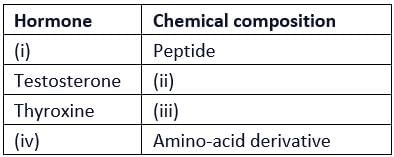Grade 9 Exam > Grade 9 Tests > Test: Endocrine Glands & Hormones - Grade 9 MCQ
Test: Endocrine Glands & Hormones - Grade 9 MCQ
Test Description
10 Questions MCQ Test - Test: Endocrine Glands & Hormones
Test: Endocrine Glands & Hormones for Grade 9 2025 is part of Grade 9 preparation. The Test: Endocrine Glands & Hormones questions and answers have been prepared
according to the Grade 9 exam syllabus.The Test: Endocrine Glands & Hormones MCQs are made for Grade 9 2025 Exam.
Find important definitions, questions, notes, meanings, examples, exercises, MCQs and online tests for Test: Endocrine Glands & Hormones below.
Solutions of Test: Endocrine Glands & Hormones questions in English are available as part of our course for Grade 9 & Test: Endocrine Glands & Hormones solutions in
Hindi for Grade 9 course.
Download more important topics, notes, lectures and mock test series for Grade 9 Exam by signing up for free. Attempt Test: Endocrine Glands & Hormones | 10 questions in 10 minutes | Mock test for Grade 9 preparation | Free important questions MCQ to study for Grade 9 Exam | Download free PDF with solutions
Test: Endocrine Glands & Hormones - Question 1
Which one of the following statements is correct?
Detailed Solution for Test: Endocrine Glands & Hormones - Question 1
Test: Endocrine Glands & Hormones - Question 2
Endorine glands have___ to carry their secretions to the specific organ.
Detailed Solution for Test: Endocrine Glands & Hormones - Question 2
Test: Endocrine Glands & Hormones - Question 3
Which one of the following is proteinaceous in chemical nature?
Detailed Solution for Test: Endocrine Glands & Hormones - Question 3
Detailed Solution for Test: Endocrine Glands & Hormones - Question 4
Test: Endocrine Glands & Hormones - Question 5
The given table enlists various hormones and their chemical nature. Select the option which completes the table.


Detailed Solution for Test: Endocrine Glands & Hormones - Question 5
Detailed Solution for Test: Endocrine Glands & Hormones - Question 6
Detailed Solution for Test: Endocrine Glands & Hormones - Question 7
Test: Endocrine Glands & Hormones - Question 8
All hypophysiotropic hormones are peptides except
Detailed Solution for Test: Endocrine Glands & Hormones - Question 8
Test: Endocrine Glands & Hormones - Question 9
Which of the following hormones is not a polypeptide?
Detailed Solution for Test: Endocrine Glands & Hormones - Question 9
Detailed Solution for Test: Endocrine Glands & Hormones - Question 10
Information about Test: Endocrine Glands & Hormones Page
In this test you can find the Exam questions for Test: Endocrine Glands & Hormones solved & explained in the simplest way possible.
Besides giving Questions and answers for Test: Endocrine Glands & Hormones, EduRev gives you an ample number of Online tests for practice
Download as PDF














